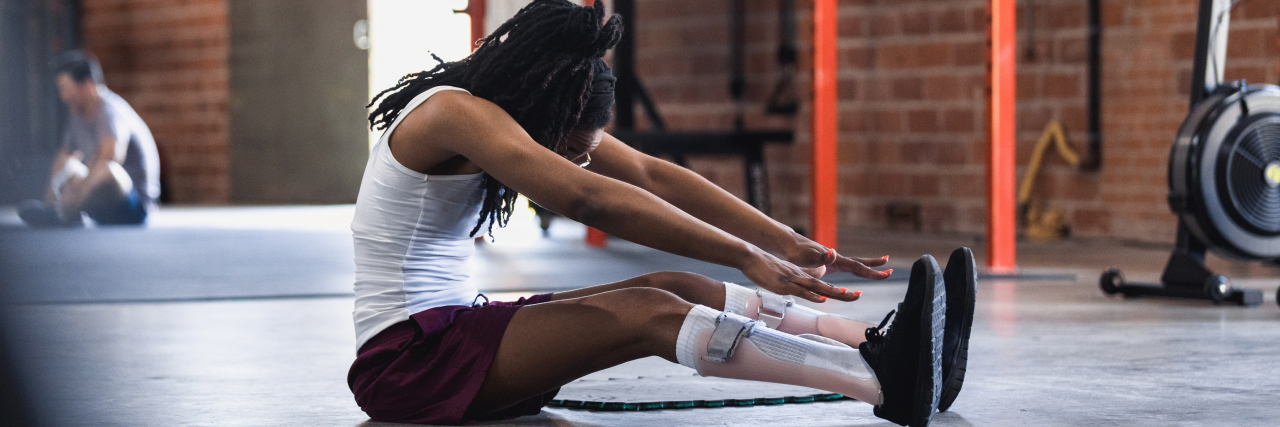9 Necessary Changes to Society That Could Help People With Cerebral Palsy
March is Cerebral Palsy Awareness Month, which is dedicated to education about and awareness of cerebral palsy. Cerebral palsy (CP) is a lifelong neurological condition that affects movement, balance, and posture, and there are 17 million people with CP worldwide. In honor of Cerebral Palsy Awareness Month, I asked 11 people what changes to society would best help them navigate their cerebral palsy. Their responses are eye-opening and shed light on what still needs to be done to improve quality of life for people with disabilities.
Responses have been lightly edited for clarity.
1. Society should understand that cerebral palsy symptoms change day by day.
“I think that we need medical professionals and our families and friends to understand that though cerebral palsy is non-progressive, it is also not static.” -Kenzie
2. Society should ensure that all buildings are fully accessible for people with cerebral palsy.
“Society needs to get rid of the ‘grandfathered-in’ buildings that don’t have to be accessible under the Americans With Disabilities Act even 32 years after it was signed into law. We need to revamp what ‘accessible’ really means — I think buildings should have to get accessibility certifications by someone who specializes in universal design and accessibility before they are allowed to be open to the public.” -Rebecca
“States should make statewide laws that every state must be accessible. That way, all of us with CP won’t have to worry about planning, especially if we want to travel somewhere for a vacation.” -Juliana
“Basic accessibility things. So many things aren’t accessible to us because people often don’t want to change them.” -Brianna
3. Society should validate the experiences of people with all severity levels of cerebral palsy.
“Most people seem to think because my cerebral palsy is mild, I don’t have my own struggles with it. People [often] make me feel like my health symptoms should be downplayed because it could be so much ‘worse.’ It would be helpful for the public to know that no matter how mild or severe a person’s disability is, their struggles are valid and should not be discounted just because things could be ‘worse.’” -Heaven
“I wish people understood that those of us with what is clinically termed ‘mild’ cerebral palsy still may struggle with many ‘smaller’ tasks.” -Kenzie
4. Society should assume that people with cerebral palsy understand.
“I wish society understood that just because someone uses a wheelchair doesn’t make them have a lower IQ.” -Kayla
“No matter what IQ a person with cerebral palsy has, they can show their smarts and prove how capable they are. Society should presume that people with cerebral palsy are competent whenever possible. A neurological condition doesn’t change how much they have to offer!” -Kelly
“I feel like people assume I have intellectual disability because my CP affects my speech, but in reality, my CP only affects me physically. I live on my own [and] pay my bills too.” -Elizabeth
5. Society should listen to people with lived experience of cerebral palsy.
“I think what would be most helpful to our community is more cerebral palsy awareness within the medical field and within mainstream media — not just by what people read in textbooks but by what people with cerebral palsy have learned and experienced.” -Tylia
6. Society should understand aging with cerebral palsy.
“I think a more enhanced understanding of how cerebral palsy affects us as we age should be put into play in both the medical and therapy environments — both mentally and physically. I think there needs to be a more clear consideration that people with cerebral palsy often age more quickly than able-bodied individuals, and we should be offered some sort of mental preparation for this.” -Karla
“We need more awareness among medical providers on how cerebral palsy severity can change pretty significantly for some people throughout life. As a kid, I could walk, run, and play sports with ease. But once I hit my mid-20s, premature aging made mobility harder and harder, and I had reduced range of motion, contractures, arthritis, and increased spasticity. Now at 36, I barely walk at all and use a wheelchair most of the time. I wish there was more understanding of this and preventative care to help.” -Gwen
7. Society should understand how to treat service animals.
“We need to teach people proper etiquette around service animals, especially because many people with CP use service animals.” -Kayla
8. Society should know cerebral palsy looks different for everyone.
“I’ve personally found that society often seems to believe cerebral palsy has a specific ‘look,’ which can lead to ableism in health settings and invalidation in everyday life. The reality is that cerebral palsy can present so many different ways in people — from needing to use a wheelchair to looking nearly ‘able-bodied.’ Society needs to understand just how vastly diverse presentations of cerebral palsy are so in the future, people with all types of cerebral palsy may have access to more validating health care.” -Kelly
9. Society should change its perception of cerebral palsy.
“As someone with CP, the biggest thing I’d like to see change in society is people’s perception of those with CP. I wish they didn’t assume I am unable to do certain things just because of the way I appear. -Elizabeth
For the rest of this month, try to keep in mind how your attitudes and actions affect people with cerebral palsy. Societal change takes time, but it starts with each one of us — and together, we can make a difference for those with cerebral palsy.
Getty image by SDI Productions.

